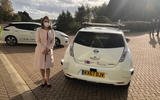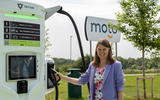Despite the outlawing of new petrol and diesel car and van sales in the UK being eight-and-a-half years away, 2030 is writ large within the automotive industry.
It’s also at the forefront of the minds of those who work at the Department for Transport – not least Rachel Maclean, the Conservative MP for Redditch who is the minister responsible for transport decarbonisation.
It seems as though the tide is turning and British drivers are slowly backing out of petrol and diesel vehicles in favour of zero-emissions ones. Statistics published by the Society of Motor Manufacturers and Traders (SMMT) show that electric cars took 10.7% of all new registrations in June. But there’s still a long way to go.
Although the focus so far has been on battery electric vehicles (BEVs), Maclean said the government is open to other technologies, such as hydrogen, playing their parts in decarbonising our vehicle parc.
“The approach we take is that we don’t prescribe one technology over another,” Maclean told Autocar in an exclusive interview. “We’re completely technology- neutral. But it’s a fact that some technologies have been accelerated beyond others. While we’re technology- neutral, we’re not outcome- neutral: the outcome has to be decarbonising the economy and hitting net-zero.
“The truth about hydrogen is that it’s very expensive to produce. The government has supported hydrogen, and it does have a role to play. We’re going to be releasing a hydrogen strategy very soon. Our ambition is to aim for 5GW of [annual] hydrogen production [in the UK]. We see it being used in the end to decarbonise areas such as HGVs, aeroplanes and ships.”
Synthetic fuels – recently touted by Porsche and other sports car manufacturers as a potential future solution – also “have a role to play” in driving down emissions, said Maclean, although she added that they will probably be used more in the aviation and maritime industries, “because those sectors are hard to decarbonise”.
One area that will be affected as the automotive industry evolves into an electrically powered one is classic cars. In May, the Historic and Classic Vehicles Alliance hit out at the government for unfairly penalising classic cars as part of its drive to decarbonise, despite the average classic car driving just 1200 miles per year. However, Maclean made a commitment to not unduly impact the sector.
“Obviously, the classic car community is a really important group and a really important part of the whole picture, and I’m sure many of your readers will fall into that category,” she told Autocar. “It’s important to be clear that while we’re phasing out the sale of new petrol and diesel vehicles, at this stage we don’t have any plans to actually ask people to remove existing or classic cars or older cars from the road.
“The existing policy is that obviously we won’t be allowing any new [petrol or diesel] vehicles to be sold [beyond 2030], but those existing vehicles can continue. It’s quite important, so hopefully I can say this and reassure people.
















Join the debate
Add your comment
Euro's target is five years on from the UK one, and that is optimistic at best. The US and rest of the world are just looking on laughing at the UK. There simply won't be the electric cars available.
Or at a cost your average family can afford.
Not until there is a major, and by that I mean an order of magnitude, increase in battery capacity. That you'd only need a tenth of the number of batteries in a car that you need currently. Then you'll have the cost reduction and easier packing within the car of those batteries.
This, sadly, was Boris once again going to massage his own vanity and having no idea of what he is doing. Worst PM in history, the most inept and incompetent we've ever had. He's so bad it's not even a competition.
The only hope we have is to realise 2030 is not a realisable target. And then maybe the likes of JLR's Bollore will come to his senses too and not kill off Jaguar.
Thank you very much for you scientific insight. You can now go bark at a different tree, troll.
CO2 is presently 0.04% of the atmosphere, not 0.4% as some misinformed character says below.
There is no evidence to suggest that by going from a present CO2 concentration of 412 ppm to a doubling, of 824 ppm would make any difference to atmospheric temperatures.
Climate Change is the biggest HOAX ever invented.
Moreover, some experts believe mankind's contribution to CO2 levels is only 3%, meaning 97% is from natural sources.